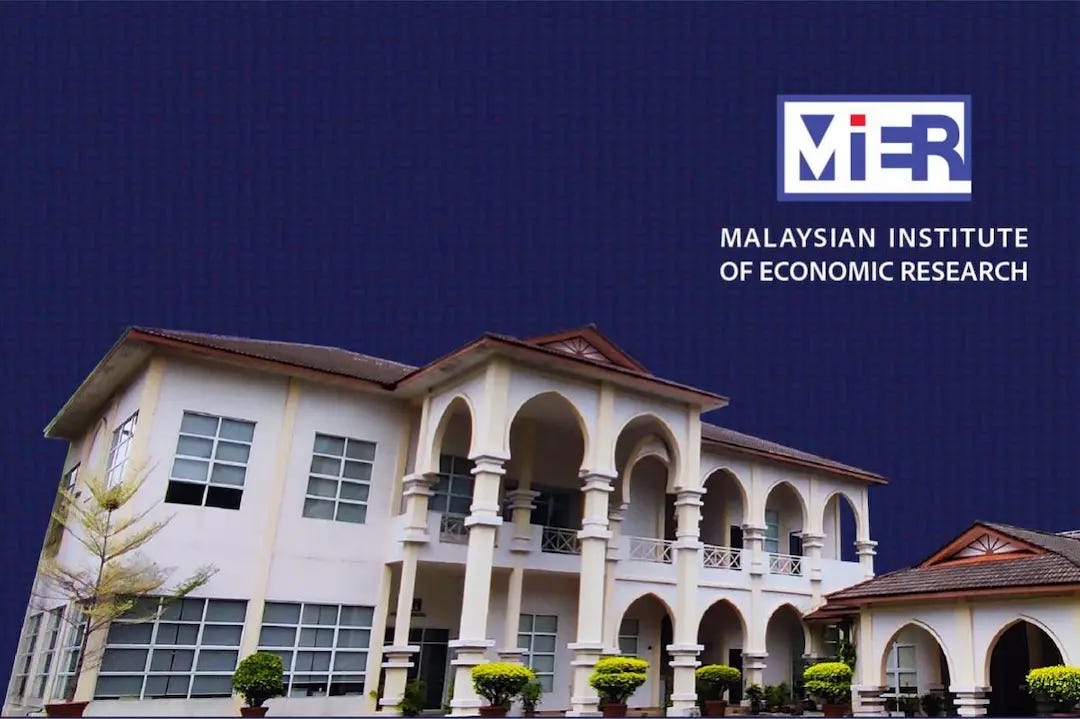The Rise and Fall of MIER: From Respected Think Tank to the Reclusive Hermit of Bukit Petaling, Lost in Esoteric Deviation and Mission Drift.
By Ismail bin Mohamed Ali
Fifteen years ago, the Malaysian Institute of Economic Research (MIER) stood as a beacon of intellectual credibility and policy influence in the Asia-Pacific region. Under the stewardship of the formidable duo of Tan Sri Sheriff Kassim as Chairman of the Board of Trustees and the leadership of Emeritus Professor Datuk Dr. Mohamed Arif Abdul Kareem as Executive Director, MIER not only managed an impressive RM15 million in endowment funds but also received consistent annual grants from the Ministry of Finance to support its operations. Its stature was further affirmed when it was ranked among the top 25 think tanks in the Asia-Pacific region by the University of Pennsylvania's prestigious Global Go To Think Tank Index. Fast forward to today, however, and the picture could not be more different. MIER has faded into near-obscurity, with both the Ministry of Finance and the Ministry of Economics withholding annual grants for the past two years.
Worse still, MIER's 2023 annual report filed with Suruhanjaya Syarikat Malaysia (SSM) contains an unsettling note on page 7 under the Basis for Qualified Opinion. It reveals that while the institute received RM2.5 million from the Ministry of Finance to conduct surveys and research on Malaysia's post-COVID-19 impact and recovery, auditors were not provided with any reports or deliverables to verify whether the institute had met its obligations. As a result, they could not determine if the financial assistance could be justifiably recognized as grant income for the year ending December 31, 2023. These paragraphs speaks volumes —it hints at deeper structural and operational issues within an institution that was once Malaysia's foremost economic think tank. If the numbers don't lie, then something is unquestionably amiss at MIER, and the time for accountability is long overdue.
Fish Rots from the Head
Oddly, over the past few years, this outfit appears to be somewhat defunct despite receiving millions from the Finance Ministry. While it proudly declares that the government is a client and benefactor, interestingly there is no representative from the government on its board of trustees (they were all sacked !).
To make matters worse, it was headed by questionable non-subject matter experts in succession. While the think tank continues to occupy government property till this day, it unhesitatingly utilises the expertise of external experts. All of this is nothing short of a good Greek drama; it has both comedy and tragedy, just like in the drama of Greek theatre!
Since 2019, the Malaysian Institute of Economic Research (MIER) has charted a perplexing course that raises serious questions about its mission, governance, and relevance. Once a respected economic think tank, MIER began dabbling in projects like the Hydrogen Bus and the Third National Car —initiatives far removed from its core mandate of providing economic research and policy analysis. These forays not only signal a concerning deviation from its original purpose but also hint at possible misalignments in its project priorities. This shift demands scrutiny, and the Ministry of Finance (MOF) would do well to request a comprehensive list of MIER’s projects from 2019 to 2023, including details of contracts, beneficiaries, and decision-makers. Such transparency could uncover conflicts of interest or patterns of favoritism benefiting specific individuals or entities.
Equally troubling are the governance issues plaguing MIER. Questions linger over irregularities in the Board of Trustees, with appointments and amendments to the memorandum of association potentially veering into dubious territory. The lack of academics and distinguished professionals on the Board —replaced instead by business figures with political connections —undermines the credibility and independence of the institution. Meeting minutes from the same period could offer valuable insights into whether these concerns are rooted in systemic governance failures.
In light of these governance shortcomings, a reset may be inevitable. The Ministry of Finance, as MIER’s primary funder and landlord, has both the authority and moral obligation to demand accountability. If necessary, it could call for the resignation of the entire Board of Trustees, following the precedent set by the Prime Minister’s Office (PMO) when it successfully restructured the Institute of Strategic and International Studies (ISIS).
These concerns don’t just hint at institutional decline —they present a compelling case for a significant overhaul or even the closure of MIER. If the evidence confirms misalignment with its mission, potential misconduct, and compromised governance, it’s fair to ask whether MIER still serves a purpose in Malaysia’s policy landscape. At the very least, these revelations force us to confront an uncomfortable but essential question: Why does MIER still exist in its current form?
———————-—————————————————————-
Ismail bin Mohamed Ali is an observer of development economics and international affairs.
Subscribe Below:




Malaysia Boleh ie Boleh sapu!
If MIER is run by a chief executive chosen on merit, things might have been different. In Malaysia this is par for the course. Under bumiputera management the organisation rots.